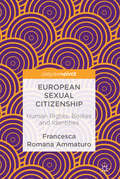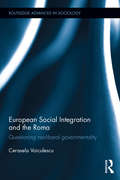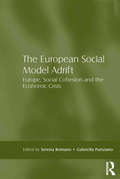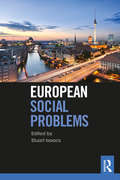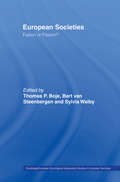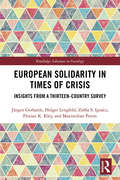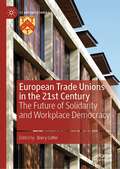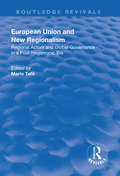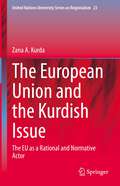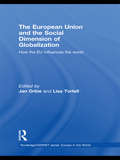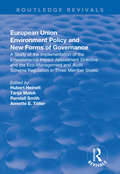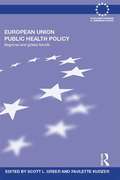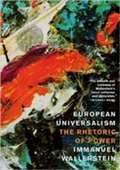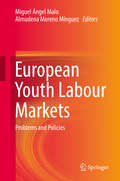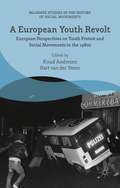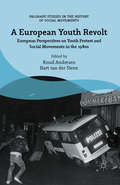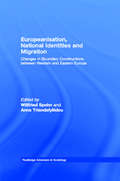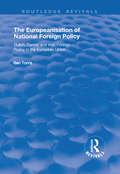- Table View
- List View
European Sexual Citizenship: Human Rights, Bodies and Identities
by Francesca Romana AmmaturoThis book is an innovative and critical contribution to the study of the human rights of lesbian, gay, bisexual, transgender, intersex and queer (LGBTIQ) people in the context of Europe. Combining legal and Foucauldian approaches, it investigates the ways in which current discourses about LGBTIQ rights in Europe are tightly bound to contemporary debates about national and trans-national citizenship. The author defines and analyzes the concept of 'multisexual citizenship' to illustrate new, flexible forms of sexual and gendered citizenship that could radically transform practices of citizenship and the current human rights framework in Europe. She does this by combining critical deconstructions of the case law of the European Court of Human Rights with ethnographic observations and sociological analysis. This interdisciplinary work will appeal to sociologists, lawyers and researchers of gender and LGBTIQ rights.
European Social Integration and the Roma: Questioning Neoliberal Governmentality (Routledge Advances in Sociology)
by Cerasela VoiculescuIn the field of political sociology and European studies, there has long been a discussion on transnational neoliberal development and ethnic groups’ self-governance. Notwithstanding, there has been limited exploration in relation to modes of knowledge production associated with neoliberal governance of the Other (e.g. ethnic and indigenous groups), which capture its idiosyncratic modes of political expression and empowerment. Drawing on Michel Foucault’s political philosophy, this book discusses European social integration as transnational neoliberal governmentality and challenges its epistemologically constituted subaltern subject. Neoliberalism is questioned in relation to its programs of securitisation of poverty and authoritarian models of self-governance associated with instrumentality of the market. In this context, the book’s rich political historical ethnography develops a new framework for the study of social power. Furthermore, inspired by Jacques Rancière's radical philosophy, European Social Integration and the Roma proposes a new mode of knowledge production about populations excessively subjected to neoliberal governmentality, heralding the epistemological decolonisation of the neoliberal subject. Presenting an insightful new prospect in critical sociology as well as the conceptualization of power and the application of theories of governmentality, this book will appeal to scholars interested in the areas of political sociology and anthropology, international relations, social and political theory/philosophy and post-development studies.
The European Social Model Adrift: Europe, Social Cohesion and the Economic Crisis
by Serena Romano Gabriella PunzianoThis volume presents a new perspective for discussing the European social contract and its main challenges, bringing together single-nation and comparative studies from across Europe. Presenting both theoretical discussions and empirical case studies, it explores various aspects of social cohesion, including social protection, the labour market, social movements, healthcare, social inequalities and poverty. With particular attention to the effects of the international economic and financial crisis on social cohesion, particularly in the light of the implementation of so-called ’austerity measures’, authors engage with questions surrounding the possible fragmentation of the European model of social cohesion and the transformation of forms of social protection, asking whether social cohesion continues to represent - if it ever did - a common feature of European countries. Breaking new ground in understanding the future of Social Europe and its main dynamics of change, The European Social Model Adrift will appeal to scholars of sociology, social policy and politics, with interests in social cohesion, the effects of financial crisis and the European social model.
European Social Problems
by Stuart IsaacsEuropean Social Problems is the first book to examine social issues in Europe from the perspective of the social sciences. It considers many of these social problems following the UK’s ‘leave’ vote. Key topics examined here include: immigration; multiculturalism and religion; health; inequalities; education; riots and protest; drugs and crime; sexuality. These core issues run as a thread through Europe and are experienced by Europeans themselves as social problems. As such, this text facilitates students’ direct engagement with some of the problematic constituents in their own lives. This text is suitable for those studying social policy, sociology, politics, international relations, criminology and education studies. In this way it functions as an accessible ‘reader’ for final year undergraduates as well as postgraduate students.
A European Social Union after the Crisis
by Frank Vandenbroucke Catherine Barnard De Baere GeertToday, many people agree that the EU lacks solidarity and needs a social dimension. This debate is not new, but until now the notion of a 'social Europe' remained vague and elusive. To make progress, we need a coherent conception of the reasons behind, and the agenda for, not a 'social Europe', but a new idea: a European Social Union. We must motivate, define, and demarcate an appropriate notion of European solidarity. We must also understand the legal and political obstacles, and how these can be tacked. In short, we need unequivocal answers to questions of why, what, and how: on that basis, we can define a clear-cut normative and institutional concept. That is the remit of this book: it provides an in-depth interdisciplinary examination of the rationale and the feasibility of a European Social Union. Outstanding scholars and top-level practitioners reflect on obstacles and solutions, from an economic, social, philosophical, legal, and political perspective.
European Societies: Fusion or Fission? (Studies in European Sociology #Vol. 1)
by Thomas P. Boje Bart Van Steenbergen Sylvia WalbyAre the recent developments in Europe bringing countries together or pulling them apart? The leading experts in this book (including Sheila Allen, Marlis Buchmann, Piotr Sztompka, and Patrick Ziltener) cover a wide range of subjects, including the move towards political democracy and market economy in Central and Eastern societies, the project of the European Union, ethnic conflict, the rise of nationalism, social exclusion and women's role in public life.
European Solidarity in Times of Crisis: Insights from a Thirteen-Country Survey (Routledge Advances in Sociology)
by Jürgen Gerhards Holger Lengfeld Zsófia Ignácz Florian K Kley Maximilian PriemThe euro crisis, several sovereign debt crises, the Great Recession, the refugee crisis, and Brexit have all challenged Europeans’ willingness to show solidarity with other European citizens and member states of the European Union. European Solidarity in Times of Crisis provides a clear theoretical framework to understand European solidarity for the first time. It offers a systematic empirical approach to determine the strength and causes of European solidarity. The authors distinguish between four domains of solidarity and test a set of theoretically derived criteria with a unique dataset to investigate European solidarity. Based on a survey conducted in thirteen EU member states in 2016, the empirical analysis leads to some unanticipated results. Europeans display a notably higher degree of solidarity than many politicians and social scientists have presumed so far. This especially applies to the support of people in need (welfare solidarity) and the reduction of territorial disparities between rich and poor EU countries (territorial solidarity), but also to the domain of fiscal solidarity (financial support of indebted EU countries). This optimistic view is less true for the domain of refugee solidarity. While citizens of western and southern EU countries accept the accommodation of refugees and their allocation between European countries, the majority of people in eastern European countries do not share this point of view. The book will appeal to students and scholars in fields such as comparative sociology, political science, social policy and migration research, and European studies. It is also relevant to a non-academic audience interested in the development of the European project.
European Solidarity Under Scrutiny: Empirical Evidence for the Effects of Media Identity Framing (Palgrave Studies in European Political Sociology)
by Christopher StarkeThis book explores the processes through which European solidarity is constructed. More specifically, it investigates how the media's framing of European identity can facilitate and/or impede the emergence of European solidarity on the individual level. Through an online experiment that tested the effect of two different media identity frames on individual solidarity during the European debt crisis, the author argues that the exposure to news articles using a value-based identity frame boosts solidarity compared to an economic identity frame. This interdisciplinary work will be of interest to scholars of political sociology, political communication and political psychology, as well as any researchers who study European integration.
European Trade Unions in the 21st Century: The Future of Solidarity and Workplace Democracy (St Antony's Series)
by Barry ColferTrade unions in Europe face a range of cross-cutting challenges. This includes the near-universal contraction in union membership; the related decline of traditionally highly unionised blue-collar industries; and the rise of automation, microprocessing, and digitalisation, which can make it cheaper for employers to invest in machines than to pay humans to work. The breakdown of the standard contract of employment and increasing rates of precarious work have further transformed the world of work. Taken together, this makes any collectivist vision of society, and the notion of solidarity upon which trade unionism is built, difficult to sustain.All this raises tough questions for trade unionists, policy-makers, and researchers alike regarding the future of trade unions, the oldest and largest civil society movement in Europe. The contributions in this volume explore the prospects for union revival across a range of cases, including by focusing on the pursuit of legal remedies and on the opportunities associated with the network society to defend the interests of workers. This interdisciplinary volume includes contributions that consider the Czech Republic, Denmark, France, Finland, Germany, Spain, Sweden, Poland, the United Kingdom, and the EU level by researchers coming from a range of disciplines and backgrounds. The volume should especially appeal to researchers and practitioners working in the fields of political science, sociology, law, and business studies.
European Union and New Regionalism: Europe and Globalization in Comparative Perspective (Routledge Revivals)
by Mario TelòThis title was first published in 2001. This is a collection of papers that look at the structure of the global economy, and its changing paradigms over the years. The contributors look at how the classic concept of state - autonomous, sovereign and freed of all constraint - never really reflected the reality of the international scene, despite the role it has played in realist and neo-realist theory for many decades. Instead, they consider that the political, social and economic characteristics originally attributed to states seem increasingly to be expressed through regional constructs. The papers in this volume show that even within regionalism there are a variety of different models that exist, and examine five of those models: the European Union; Mercosul-Mercosur; the North American Free Trade Area (NAFTA); the Association of South East Asian Nations (ASEAN); and the South African Development Community (SADC).
The European Union and the Council of Europe
by Marina KolbWith the increasing prominence of fundamental rights within the EU it increasingly interferes in the core competence of the Council of Europe. This book traces the EU and the Council of Europe relationship in the field of human rights marked by mutual interferences and overlap and explores which factors trigger cooperation or conflict between the two organizations. Investigating the cases of data protection, the fight against terrorism, challenging Roma discrimination, the Memorandum of Understanding and the Fundamental Rights Agency through the lens of an implementation literature and management studies-perspective, this book contends that the biggest threat to interorganizational cooperation is organizational self-interest, despite a shared policy outlook. The book furthers the agenda set by the literature in this field by providing a new theoretical framework and an in-depth empirical study of two main actors in the field of human rights protection in Europe from a political science perspective. "
The European Union and the Kurdish Issue: The EU as a Rational and Normative Actor (United Nations University Series on Regionalism #23)
by Zana A. KurdaThis book focuses on the European Union as an actor involved in the transnational Kurdish issue covering Turkey, Iran, Iraq and Syria. It demonstrates that, instead of being simply a humanitarian actor in the issue, the EU has considered its bilateral interests with the four states in question as well as its extent of acceptance in approaching the Kurdish issue. It has combined its traditional humanitarian/normative consideration with its geopolitical interests in relation to strategies related to the four states. This book provides a unique perspective on the EU as an actor in the Kurdish issue and from a wider perspective, it provides interesting insights into the EU’s interactions with geopolitics, which has become the topic of a lively scholarly debate in recent years. The book is a resource for researchers and students studying the European Union as a global actor, and for governmental or non-governmental professionals dealing directly with, or having interest in, the EU and/or Kurdish affairs.
The European Union and the Paradox of Enlargement: The Complex Accession of the Western Balkans (Palgrave Studies in European Political Sociology)
by Tatjana SekulićThis book sheds light on the contradictions underlying the European Union enlargement process, specifically to the Western Balkans, challenging the common assumption that the integration of an extended European space might be possible without mutual transformation of the institutions and agencies involved. Sekulić maps the institutional dimension of the accession process, and analyses how the conditionality principle shapes and constrains the space for negotiation within the EU. Combining ethnographic research with the discourse analysis of the European Commission’s reports and documents from 2008 to 2019 concerning the Western Balkan countries, the book also explores the perceptions and agency of the individuals involved in this process. The European Union and the Paradox of Enlargement will be of interest to students and scholars of European integration, the sociology of Europe and the EU, and Eastern European and Western Balkan studies.
The European Union and the Social Dimension of Globalization: How the EU Influences the World (Routledge/GARNET series)
by Jan Orbie Lisa TortellThis volume provides a comprehensive account of the European Union’s social role in the world, assessing the EU’s ability to shape the social aspect of globalization from both law and political science perspectives. Focusing explicitly on the EU, the authors address the extent of coherence between the Union’s international social objectives compared with the activities of the International Labour Organization (ILO) and with other EU foreign policy goals. Various dimensions of Europe’s global social role are addressed, including: the social dimension of EU trade relations the involvement of civil society in EU development policies the linkage between the EU’s internal and external ‘social model’ the export of Europe’s social acquis through enlargement and neighbourhood policies the EU’s international position on health, gender equality, children’s rights, and corporate social responsibility the role of the Union in the ILO The European Union and the Social Dimension of Globalization will be of strong interest to students and researchers in EU studies, Globalization studies, and Social Policy.
The European Union as a Small Power
by Asle TojeThe post-Cold War period is coming to an end. After a decade of foreign policy integration Europe faces multipolarity internally divided and externally weak. Toje argues that due to the lack of a workable decision-making mechanism the EU is destined to play the limited but distinct role of a small power in global politics.
European Union Environment Policy and New Forms of Governance: A Study of the Implementation of the Environmental Impact Assessment Directive and the Eco-management and Audit Scheme Regulation in Three Member States (Routledge Revivals)
by Hubert HeineltThis title was first published in 2001. Outlining the results of a three-country study, this text examines the impact of EU policy on the domestic, political and institutional environment. It tests ideas about new forms of governance that reflect the values of participation and empowerment of local interests, particularly through a close scrutiny of the environmental impact process. The book also analyzes the responses of the business sector in three countries - Germany, Greece and Great Britain - to the introduction of a voluntary environmental management system, the eco-management and audit scheme.
European Union Public Health Policy: Regional and global trends (Routledge Advances in European Politics)
by Scott L. Greer Paulette KurzerRanging from influence over world trade laws affecting health to population health issues such as obesity to the use of comparative data to affect policy, the EU’s public health policies are increasingly important, visible, expensive and effective. They also provide an invaluable case study for those who want to understand the growth and impact of the EU as well as how states can affect their populations’ lives and health. European Union Public Health Policy capitalizes on extensive new research, providing an introduction to the topic and indicating new intellectual directions surrounding the topic. An introductory section and extended conclusion explore the meaning of public health, the relationship of EU public health policy to health care policy, and the place of public health in the study of European integration and Europeanization. Focusing on health system transformation, global health governance and population health, the chapters address: Relevant policy issues and EU policies; Effects of the EU policies on practice or outcomes; An explanation of the policy trajectory; Current issues and likely future directions or conflicts. Drawing together an international and multidisciplinary selection of experts, this volume is an important contribution for all those interested in public health policy, EU health policy and EU governance.
European Universalism: The Rhetoric of Power
by Immanuel WallersteinAt a time when intervention - in the name of democracy and human rights - has returned to the center of world politics, Wallterstein's treatise is both essential and convincing.
The European Yearbook of Business History (Routledge Revivals)
by T. R. GourishThis title was first published in 2001. A collection of research and review articles, in English, on the history of private enterprise based in European countries, as well as studies of transnational, public and state corporations. The period of interest covers the 19th and 20th centuries.
European Youth Labour Markets: Problems and Policies
by Almudena Moreno Mínguez Miguel Ángel MaloThis timely analysis examines the complex state of youth unemployment across Europe and offers cogent policy suggestions for addressing this longstanding societal problem. The findings reveal numerous national and regional factors affecting youth joblessness—not only market and economic challenges, but also deep sociocultural and political dynamics underlying the situations. Coverage details how the standard transition from school to work is disrupted in an already depressed adult job market, and compares a wide range of responses in terms of both young people’s educational decision-making and national youth policy. In particular, contributors assess whether the current crop of Youth Guarantee programs can/should be a model for employment policy across the continent.Among the topics covered:Youth labour market prospects and recent policy developments.Youth labour market in Central and Eastern Europe.Early school dropout in Spain: evolution during the Great Recession.Overeducation among European university graduates: a constraint or a choice?Promoting youth employment in Europe: evidence-based policy lessons.The evaluation of a Finnish youth guarantee: lessons for Europe?European Youth Labour Markets is of interest to an international audience of economists, sociologists, and leaders in governmental, non-profit, and corporate sectors through its broad and comparative macroeconomic focus and implications for policymaking, research, resource allocation, and policy evaluation.
A European Youth Revolt: European Perspectives on Youth Protest and Social Movements in the 1980s (Palgrave Studies in the History of Social Movements)
by Knud Andresen Bart van der SteenA European Youth Revolt.
A European Youth Revolt: European Perspectives on Youth Protest and Social Movements in the 1980s (Palgrave Studies in the History of Social Movements)
by Bart van der SteenDuring the early 1980s, large parts of Europe were swept with riots and youth revolts. Radicalised young people occupied buildings and clashed with the police in cities such as Zurich, Berlin and Amsterdam, while in Great Britain and France, 'migrant' youths protested fiercely against their underprivileged position and police brutality. Was there a link between the youth revolts in different European cities, and if so, how were they connected and how did they influence each other? These questions are central in this volume. This book covers case studies from countries in both Eastern and Western Europe and focuses not only on political movements such as squatting, but also on political subcultures such as punk, as well as the interaction between them. In doing so, it is the first historical collection with a transnational and interdisciplinary perspective on youth, youth revolts and social movements in the 1980s.
Europeanisation, National Identities and Migration: Changes in Boundary Constructions between Western and Eastern Europe (Routledge Advances in Sociology #Vol. 5)
by Anna Triandafyllidou Willfried SpohnThis book provides theoretical and empirical discussion of migration, identity and Europeanisation. With contributions from leading international scholars, it provides both an overview of theoretical perspectives and a comprehensive set of case studies, covering both Eastern and Western Europe. Contributors draw from disciplines such as historical sociology, discourse analysis, social psychology and migration studies, while the editors bring these subjects into a coherent theoretical and historical framework, to discuss the emergence of new collective identities and new borders in Europe today.
The Europeanisation of National Foreign Policy: Dutch, Danish and Irish Foreign Policy in the European Union
by Ben TonraThis title was first published in 2001. This study questions whether the development of foreign and security policy co-operation within the EU has constrained or empowered Danish, Dutch and Irish foreign policy. This entails a study of the relationship between national foreign policy and EU frameworks for co-operation.
Europeanization and Tolerance in Turkey
by Ayhan KayaThe book questions the popularity of the notion of tolerance in Turkey, and argues that the regime of tolerance has been strengthened in parallel with the Europeanization process, which has boosted the rhetoric of the Alliance of Civilizations in a way that culturalized what is social and political.
